Ulysses Grant Reads Jesus and John Wayne
Yet another President holstered a copy of Jesus and John Wayne beside his sword. Ulysses Grant was relaxing near a corner post with his hand confidently resting on his hip.
“It’s a humbling book, but it doesn’t surprise me that much,” the President opined. “The suffragists have been hounding Congress for a whole year now. Not about religion, abuse, or the culture of manliness per se, but about the simple economic realities of women’s stead and these various inequities.”
“Yes,” I reflected, “other Presidents were confronted with similar challenges in reading the book, but as statesmen they said they had nothing to do with it.”
“Heh,” the President chuckled. “When the state is paying women a fraction for the same amount of work? When the courts favor men’s power over women? It was clear enough what the right course of action was when I was presented with the opportunity to sign the law protecting married women’s property from their husbands’ debts and giving women the ability to sue in court. The same for the Arnell bill and women federal works and their pay.
“There is something to say about male chivalry that DuMez doesn’t address. Nevertheless, her account of these hyper-masculine religious leaders trying to take over the government and public life was downright disturbing.
“So I say this: Leave the matter of religion to the family altar, the church, and the private schools. Keep the church and the state forever separate.”
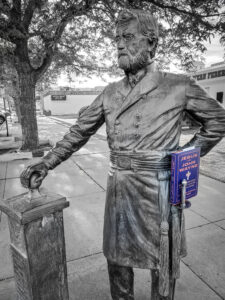
Rutherford B. Hayes is Walking Jesus and John Wayne
By this time, I was getting quite hungry. So I switched directions on the street looking for some grub…only to find President Rutherford Hayes marching along with a copy of, you guess it, Jesus and John Wayne, propped on the back of his cane. “What a curious way of hauling books,” I thought.
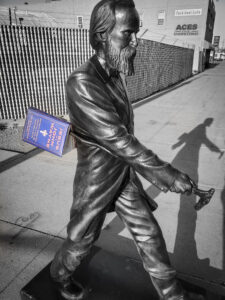
He looked to be quite in a hurry, so I didn’t bother him.
James Garfield is Reading Jesus and John Wayne
President James Garfield was standing around a different intersection mumbling this and that as he perused a book. His face was contorted, his gaze serious and alarmed. I watched him in secret for a few moments before approaching him to talk. By that time, his face relaxed a bit, as if resigned to some agreement.
“Mr. President,” I began.
“Yes young lad? How are you this fine day?” he replied.
“Oh, not bad. Say, what’s that you’re reading?”
“This?” he pretended to not know. “Well it’s a best selling book by a Dutch lady in the North. Everyone is reading it, so I thought, why not?”
But before I could reply he immediately continued, “Honestly, though, it … well, it really doesn’t suit me. Perhaps you might be more interested in it,” he said, handing me the volume. He apparently didn’t notice I was already holding two other copies, or at least, didn’t care.
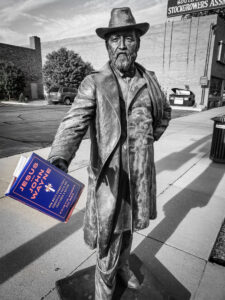
“Very good then. Thank you!” I said, and walked off.
Chester Arthur Testifies About Jesus and John Wayne
Things took an unusual turn when I found President Chester Arthur testifying before a court. In a strange procedure I have never seen, one of his hands was on the Bible, while the other was holding up a copy of Jesus and John Wayne. It was apparent I had come at the end of some grand speech that was, indeed, about gender.
“And that, ladies and gentleman, is why polygamy is from the devil!” A roar of applause erupted from the surrounding crowds.
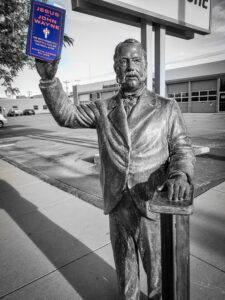
I stared with great interest as he summarized how Jesus and John Wayne provided the best argument to date on how patriarchy and religion leads to the destruction of society—particularly by these “Mormons.”
But what was more interesting were the murmurs and comments from the crowd. “It’s in the good book,” I heard from two or three. “Amen!” was the reply. Were they referring to the Bible … or Jesus and John Wayne? Was there a DuMez cult developing!?
Grover Cleveland Contemplates Jesus and John Wayne
A hop, skip, and flop away I found Grover Cleveland staring into the abyss with his hand on one thigh and the other holding a copy of Jesus and John Wayne.
“Heavy stuff, huh?” I remarked with a slight grin. He looked at me, at the book, and back to the horizon. Then he sighed.
“You know, from the youngest age my church and parents taught me that male headship and godly authority in the home was God’s design for creation, that this was how things should be. But, now I’m not so sure.”
“Oh boy,” I thought to myself. “He’s going Van Buren full send…”
“Look at its results. And why hasn’t the institutional church been paying any attention? How many Mark Driscolls and Mahaneys and disgusting fools like Douglas Wilson have to drag on and tear us asunder?”
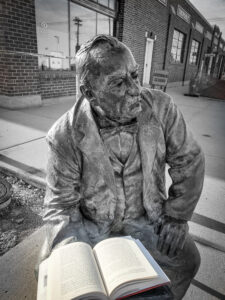
“But,” I said, probing his partially developed thoughts, “women still need to be kept in subordination by men, right? Otherwise they’ll, you know, destroy civilization?”
He gave me a quizzical look as if he wanted to say “yes,” then realized he was being led on.
“What’s your name, son?”
“Charles, and goodbye!” I fumbled and ran off.
William McKinley Argues on the Phone About Jesus and John Wayne
I skipped away and came across William McKinley. He had a telegraph in one hand and a copy of you-know-what in the other.
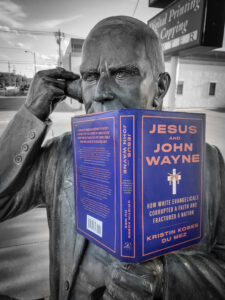
“No no, she’s not simply revising womanly duty. She’s questioning the whole concept of feminine duty!” he said over the phone. I listened as the conversation quickly shifted towards nationalism. “… We have a war with the Mexicans, and right when we need national support she questions our greatness!” He became particularly furious at the use of “white” in the book’s subtitle, and ranted about the pressure he was getting because of the Wilmington Insurrection, a rant that included, well, a few choice slurs and words that need not be repeated.
I had no idea who was listening on the other end. But it seemed like he had just finished reading the book and wanted someone else in a position of power to know about it, and presumably, do something about it.
Teddy Roosevelt Reads Jesus and John Wayne, and…
While some of these encounters were accidental (or not so accidental) and the journey was getting quite long, I had really been looking forward to seeing one President in particular. And that President was Teddy Roosevelt, Mr. White American Masculinity himself.
Now, as I had already learned, talking to Presidents was not so easy. They could be busy, absent-minded, or what have you. So while I had high hopes of obtaining at least some kind of answer to my question, and possibly further discourse, I was prepared for the real possibility of disappointment. (And let’s face it: there’s no way in hell Teddy Roosevelt was reading Jesus and John Wayne.)
After circling the area for not a small amount of time, I walked to the intersection of Main Street by Murphy’s Pub. There, I found him, standing in all his frontier cowboy glory. Happily, the crowd around him was not as large as normal, and he seemed quite at ease. Even with his pistol holstered on his waist and his arm rested on his sword, he seemed rather approachable.
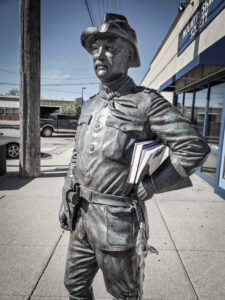
But resting above the sword on his arm was literature. Indeed, not one but two books.
“Was ist das?!” I said aloud in befuddlement. I was surprised he had any books at all, but then, this.
“What on earth could that other book possibly be?” A bunch of options raced through my mind, but first I had to answer: did the book have anything to do with Jesus and John Wayne? If so, was it similar to it, or was it…”
I stepped in for a closer look. A trick of the eye: I could have sworn I saw Wild at Heart’s distinctive cover image. But then I blinked, shook my head, and realized that my mind had simply filled in the most probable option. I rubbed my eyes and the sweat from my brow and stepped in for a closer gaze.
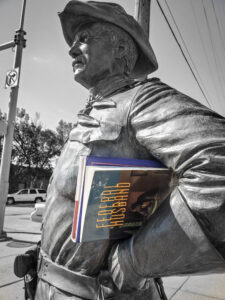
“Federal Husband” by Douglas Wilson.
“Good afternoon, Mr. President!” I said with enthusiasm.
“Good afternoon, sir. And you are?”
“Just a traveling way-fellow, taking pictures of statues during the hottest time of the year amongst annoying tourists for a project that no one will probably read. Well anyway. Say! I was wondering,” I asked rather directly in my usual way, “what do you think of Kristin Kobes DuMez’s Jesus and John Wayne?”
“Horseshit.” Without skipping a beat.
I was so taken aback by how prepared he was in responding—all with his typical air of confidence— that I was stunned speechless. He simply answered the question.
Yet, he continued, as my silence seemed to penetrate the air and cause a stirring.
“Fresh horseshit from my ranch 240 miles north of where you’re standing, to be more accurate,” he grinned.
“Listen, my dear son. It’s not a woman’s job to be writing books about what a man’s job or a woman’s job is or isn’t. And I…”
“But Mr. President,” I interrupted, “the mulligans, the abusers, the dominating men in power who are …”
“Oh good grief! These are nothing more than a few bad apples! Fine men who just blew off course. DuMez is barking up the wrong tree and using the wrong gun—hell, she probably doesn’t even know the kind of pistols on the cover of her own book! These are merely corruptions of godly masculinity,” he explained, “not what a true man should be. Everyone knows that.”
After being silenced and realizing I had just rudely interrupted Teddy Roosevelt—but also realizing that he completely deserved it and that I was being as rude and “manly” as he probably wished me to be, I began to hear his voice again as my mind re-entered the conversation.
“I’m a rational man and like to hear both sides of an argument, and between DuMez and Wilson, there is no question whose understanding of these matters is superior.
“Here, look,” he said yanking the book from his arm like he was pulling out his pistol for a duel. “Page 74: true masculinity is
that masculinity which embraces headship, takes the initiative, serves responsibly, provides for his own, and represents his household to the other governments established by God. Modern Christian men can be divided into two categories: those who have acquiesced to the current dictates requiring this effeminacy and those who think they have not capitulated because they are still allowed to beat their chests at home.
“So there it is!” Teddy declared. “Now tell me what the blazes is wrong with that?! In fact,” he started to page further into the book, “I recall that Wilson earlier observed that
In the final analysis, the problem of women who overstep their bounds in a church is not their problem. The difficulty is with the men who let them. (Federal Husband, 67)
“You see? WEAK MEN. That’s our problem. That’s your problem. That’s everyone’s problem. Whether in state or in church or within marriage. Speaking of marriage, to quote again from the good book:
Some men, who do not want the responsibilities associated with leadership, may be content to marry a woman who brings ‘direction’ to the relationship, but a hard-driving woman is likely to be an unpleasant companion after a very short period of time…A woman who rejects domesticity, who wants to live like a Barbie married to Ken, should be avoided along with all other sexual pests. (104)
“Coming from a 400-year tradition of colonizing the rugged frontier, you’d think Dutchwomen like DuMez would understand their duty,” the President berated. “Speaking of colonizing!”
“Oh Lord, what now?” I said to myself.
“My favorite quote from Wilson puts it better than I ever could”:

He stood next to me, nudged my side and showed me some more. “These were particularly good,” he snickered.
I gagged. A foul taste entered my mouth. But no mind my heaving along the sidewalk. The President had already turned away to walk more closely in front of growing crowd before him. There, he gave the following declaration to conclude our conversation, as pious wisdom for the land:
It is not the critic who counts; not the man who points out how the strong man stumbles, or where the doer of deeds could have done them better. The credit belongs to the man who is actually in the arena, whose face is marred by dust and sweat and blood; who strives valiantly; who errs, who comes short again and again, because there is no effort without error and shortcoming; but who does actually strive to do the deeds; who knows great enthusiasms, the great devotions; who spends himself in a worthy cause; who at the best knows in the end the triumph of high achievement, and who at the worst, if he fails, at least fails while daring greatly, so that his place shall never be with those cold and timid souls who neither know victory nor defeat.